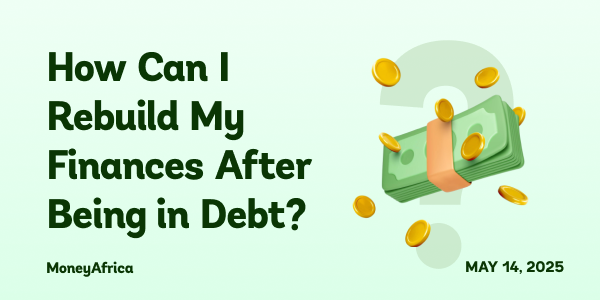Let’s talk about something many people are going through but rarely say out loud: being in debt.
That feeling of watching alerts from loan apps or banks pop up on your phone and wishing they’d just disappear. That weight on your chest when you know the money in your account can’t match the bills in your hand. That quiet shame of pretending everything’s okay when your finances are actually falling apart.
We get it. We’ve been there.
And we want to tell you something important: You can come back from it.
Here’s how to rebuild your finances after being in debt—step by step, no fluff:
Step 1: Forgive yourself, seriously
Before you crunch numbers, open your bank app or start budgeting, start with your heart. You’re not lazy. You’re not foolish. Life happens. Maybe it was job loss. Medical bills. Family responsibilities. Or even just poor money habits from not knowing better. Whatever got you there, beating yourself up won’t fix it. But healing your mindset? That’s the first real win.
Step 2: Know your numbers
Avoiding your account balance won’t make the debt disappear. You need clarity, not shame.
Take a sheet (or your Notes app) and write this out:
- Who do I owe?
- How much?
- What are the interest rates?
- Which ones are urgent?
- Are there any you can renegotiate?
Yes, it might sting to see the total, but knowing the truth gives you the power to create a plan.
Step 3: Create a humble, realistic budget
Not a fancy spreadsheet—just a simple one that works. Focus on:
- Essentials (food, rent, transport)
- Minimum repayments (so your debt doesn’t grow)
- Small savings (₦5k a month is still a win)
- Cut back where you can—Netflix, impulse spending, eating out, etc.
This is your season of discipline, not deprivation. You’re not being punished, you’re being intentional.
Step 4: Pick a debt repayment method
Here are two methods that work:
- Snowball method:
Pay off the smallest debt first. It gives you a confidence boost. - Avalanche method:
Pay off the highest-interest debt first. It saves you money in the long run.
Whichever you choose, stick with it. Even if you’re only paying ₦10k consistently—it adds up.
Step 5: Find small ways to grow your income
Even an extra ₦20k–₦50k monthly can make a big difference. Can you:
- Sell something you’re not using?
- Offer a service on weekends?
- Start a mini side hustle?
- Apply for remote gigs?
Don’t be afraid to start small. Extra income isn’t about blowing up; it’s about creating breathing room.
Step 6: Build a safety net (slowly)
Start putting something aside, even if it’s just ₦1,000/week. Your emergency fund is what will stop you from running back to debt when life strikes again.
Key takeaways:
- You don’t need to fix everything in one month. This isn’t a race. It’s a reset.
- You’re not behind. You’re not too late. You’re not the only one.
- You’re just a determined person, taking responsibility and choosing growth, even when it’s hard. And that’s powerful.
You’ve got this. We believe in you. And if you need help mapping your own “bounce-back plan,” we’re here to help. Don’t hesitate to send us a DM on any of our socials or book a session on www.themoneyafrica.com for expert insights and tailored investment strategies.

